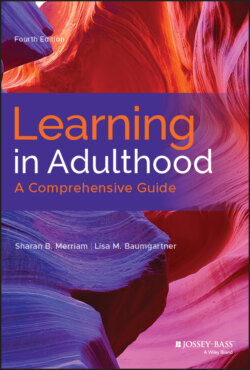Читать книгу Learning in Adulthood - Sharan B. Merriam - Страница 24
Collaborativism or Online Collaborative Learning
ОглавлениеCollaborativism, a theory that emerged from 30 years of empirical research, is based on the principles of collaborative learning, which include “1. Positive mutual dependency; 2. Personal accountability. 3. Promoting interaction; 4. Social skills, and 5. Group processes” (Johnson & Johnson, 1999 as cited in Magen-Nagar & Shonfeld, 2018, p. 622). In addition, the teacher's role is important. Collaborativism emphasizes instructor-facilitated student discussions that “lead to both conceptual understanding and knowledge products” (Harasim, 2017, p. 187). The instructor organizes discussions, introduces content, and models “analytic language that represents the discipline” (p. 187). Collaborativism is often used with ODE as it creates a discussion-based experience combined with an “informational study component.” The “flipped classroom” is an example of this (p. 188). Collaborativism focuses on “the key role played by discourse in knowledge creation, sharing, dissemination, application, and critique” (Harasim, 2017, p. 189). Online discourse can occur through texting, chat, forums, webinars, e-mails, forums, and blogs. Discourse is undertaken to “seek common understanding” as opposed to agreement, and to “expand the base of accepted facts” (p. 194). The discussion generated using the collaborativist framework moves groups from generating ideas on an issue (often through brainstorming), to clarifying ideas, to coming to a shared understanding of a “knowledge product or solution” (p. 195). The final product may be in the form of a report, final paper, presentation, or summary statement by the group.
Collaborativist-based online courses meet certain criteria. They include discussion forums where place-independent discourse can occur. Learners can be anywhere and can communicate with each other. People from other cultures and experts from around the world can be invited to contribute to the discussion (Harasim, 2017). Time-independent or asynchronous discourse means students can read and respond to discussion forums at any time. They can reflect and write a thoughtful response. “Collaborativist discourse is primarily text-based, although multimedia tools such as audio, video, animation and even avatars may be incorporated into online course activities and discourse” (p. 210). Writing helps us engage in deliberation, and often we learn what we are thinking in the act of writing. Discourse is mediated through the Internet in a collaborativist framework. This framework gives learners a sense of social presence and counteracts the loneliness that can occur in online courses. Researchers also found that teachers need three things to be successful using the online collaborative learning (OCL) framework: a school or organization that supports creating interpersonal and social relations in courses, a pedagogical understanding of OCL including both the positive and negative aspects, and OCL training for instructors (Magen-Nagar & Shonfeld, 2018).
